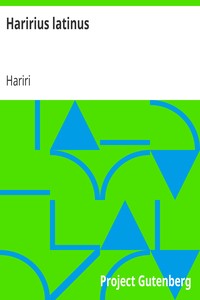Haririus latinus by Hariri
"Haririus Latinus" by Hariri is a collection of literary narratives likely written in the late 10th century. The work consists of a series of dialogues and stories, primarily featuring characters such as Abu Seid and Haret, who explore themes of eloquence, human experience, and moral instruction through intricate storytelling and verse. The narratives are characterized by their rhymed prose, embodying the tradition of Arabic storytelling known as "Makamat." At the start of
the book, we are introduced to the context of its creation, set during gatherings of learned men who shared and critiqued each other's tales. The opening includes discussions on the nature of Hariri's work, emphasizing its stylistic elegance and intricate themes involving humanity's struggles and ethical considerations. We meet the character Haret Hammamita, a wanderer reflecting on his experiences and interactions with others, as well as his admiration for Abu Seid, portrayed as a master of eloquence. The text combines literary aspects with philosophical musings, inviting readers into a rich world of Middle Eastern literature and culture. (This is an automatically generated summary.)
Read or download for free
| How to read | Url | Size | |||
|---|---|---|---|---|---|
| Read now! | https://www.gutenberg.org/ebooks/69275.html.images | 703 kB | |||
| EPUB3 (E-readers incl. Send-to-Kindle) | https://www.gutenberg.org/ebooks/69275.epub3.images | 324 kB | |||
| EPUB (older E-readers) | https://www.gutenberg.org/ebooks/69275.epub.images | 338 kB | |||
| EPUB (no images, older E-readers) | https://www.gutenberg.org/ebooks/69275.epub.noimages | 332 kB | |||
| Kindle | https://www.gutenberg.org/ebooks/69275.kf8.images | 664 kB | |||
| older Kindles | https://www.gutenberg.org/ebooks/69275.kindle.images | 610 kB | |||
| Plain Text UTF-8 | https://www.gutenberg.org/ebooks/69275.txt.utf-8 | 570 kB | |||
| Download HTML (zip) | https://www.gutenberg.org/cache/epub/69275/pg69275-h.zip | 313 kB | |||
| There may be more files related to this item. | |||||
Similar Books
About this eBook
| Author | Hariri, 1054-1122 |
|---|---|
| Translator | Peiper, C. R. S. (Carl Rudolph Samuel), 1798-1879 |
| Title |
Haririus latinus sive Mohammedis Alcasemi, filius Alii, filius Mohammedis, filius Otmani, Hariri bazrensis, haramensis, narrationes consessuum nomine celebratae |
| Original Publication | Poland: Carl Wilhelm Immanuel Krahn,1832,pubdate 1836. |
| Note | Reading ease score: 36.6 (College-level). Difficult to read. |
| Credits | Aurēliānus Agricola |
| Language | Latin |
| LoC Class | PJ: Language and Literatures: Oriental languages and literatures |
| Subject | Arabic literature -- Translations into Latin |
| Category | Text |
| EBook-No. | 69275 |
| Release Date | Oct 31, 2022 |
| Most Recently Updated | Apr 2, 2023 |
| Copyright Status | Public domain in the USA. |
| Downloads | 128 downloads in the last 30 days. |
| Project Gutenberg eBooks are always free! | |


